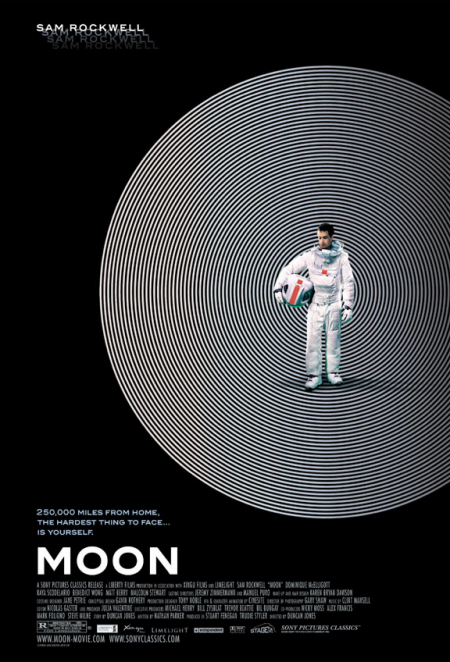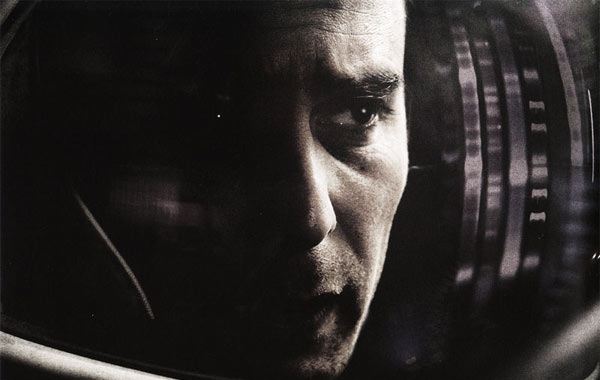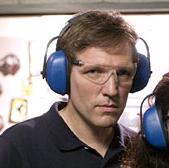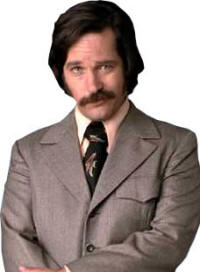 DRAG ME TO HELL
DRAG ME TO HELLStarring: Alison Lohman, Justin Long, Lorna Raver, Clark Gregg
Director: Sam Raimi
Screenplay: Sam Raimi and Ivan Raimi
As sophisticated audience members, we’re all used to hyperbolic statements adorning movie posters. Especially horror movie posters that scream “White knuckle thrill ride!” “You’ll be on the edge of your seat!”. We all know that, more often than not, these statements are incorrect. This is not the case with Sam Raimi’s Drag Me to Hell. After a long absence, the director has returned to the genre that he helped define with, well, a white knuckle thrill ride that will have you on the edge of your seat.
In terms of story, Drag Me to Hell is a very simple, straightforward tale. Loan officer Christine Brown is told she needs to be better with the tough decisions if she wants a promotion, and so refuses to help old Mrs Ganush who is being evicted from her home. Humiliated, the woman puts the terrible Lamia curse on Christine. The curse means that the victim will be tormented for three days before being taken to Hell. Cue shocks, delirious set pieces, and Sam Raimi cutting loose for the first time in years.
 Those of us who saw at least one Evil Dead film before the release of Spider-Man will recall a sense of pleasant surprise when Raimi managed to adapt his distinctly individual style to a comic book franchise so skilfully. Spider-Man 2, in particular, remains one of the strongest comic book movies to date, capturing the tone of the source material while keeping a sense of authorship. Then came the disappointing Spider-Man 3, and the sense that the director had somewhat lost his way. He hadn’t made a horror film since The Gift, and even that was a sadly sub-par Southern Gothic ghost story. Thankfully, Drag Me to Hell shows that Raimi has lost none of his energy, and none of his ability to put audiences on edge.
Those of us who saw at least one Evil Dead film before the release of Spider-Man will recall a sense of pleasant surprise when Raimi managed to adapt his distinctly individual style to a comic book franchise so skilfully. Spider-Man 2, in particular, remains one of the strongest comic book movies to date, capturing the tone of the source material while keeping a sense of authorship. Then came the disappointing Spider-Man 3, and the sense that the director had somewhat lost his way. He hadn’t made a horror film since The Gift, and even that was a sadly sub-par Southern Gothic ghost story. Thankfully, Drag Me to Hell shows that Raimi has lost none of his energy, and none of his ability to put audiences on edge.From the riotous opening scene (brace yourself, seriously), Raimi grabs his audience by the throat and lets us know exactly what we’re in for. The film is at once wonderfully nostalgic (cloven-hoofed bestial shadows, gooey gross-out scares, terrifying old women are all present) and pleasantly self-aware. There’s even a couple of Evil Dead references for the faithful to spot. Then there’s the sheer volume. It’s a film that’s worth catching at the cinema, as the deafening sound effects will no doubt be lost on television. It’s not just about the jumps, though. Drag Me to Hell is, perhaps most of all, about the build-up. Raimi is a director that has always seemed to delight in punishing not only his actors but his audiences. With this new film, he finds a formula that is tried and tested and puts it to use over and over again. And this is part of what makes Drag Me to Hell work. We know what’s coming, and there’s absolutely nothing we can do about it. Christine’s boyfriend Clay is conveniently offscreen, the music drops, we move in for a close-up…and we’re off! It’s a tactic that is used several times during the film, but it works every time.
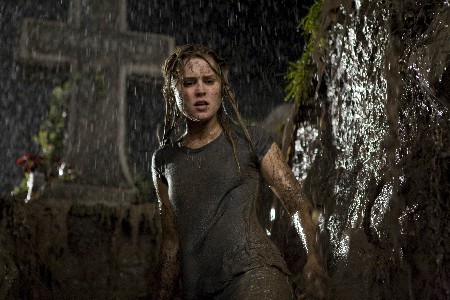 Raimi is helped not only by the deafening sound effects, and a highly effective score by Christopher Young, but by Alison Lohman’s central performance as Christine. It is common knowledge that Ellen Page was set to star but was forced to drop out, but to Lohman’s credit, she makes the role her own. She’s not helped by the script, with its occasionally duff dialogue and clunky back-story. Clearly, and understandably, Raimi is more interested in scaring the pants off us than establishing any sort of believable character arc. However, thanks to Lohman, we stick with Christine throughout her journey. It’s also a pleasant surprise that Christine isn’t the traditional scream queen. She’s resourceful (her fight with the old lady at the beginning is brutal), and she’s prepared to take drastic steps to save her own life (poor kitty…). There are also solid performances from Justin Long, who fares surprisingly well in the thankless “sceptic boyfriend” role, and from Lorna Raver as the evil Mrs. Ganush.
Raimi is helped not only by the deafening sound effects, and a highly effective score by Christopher Young, but by Alison Lohman’s central performance as Christine. It is common knowledge that Ellen Page was set to star but was forced to drop out, but to Lohman’s credit, she makes the role her own. She’s not helped by the script, with its occasionally duff dialogue and clunky back-story. Clearly, and understandably, Raimi is more interested in scaring the pants off us than establishing any sort of believable character arc. However, thanks to Lohman, we stick with Christine throughout her journey. It’s also a pleasant surprise that Christine isn’t the traditional scream queen. She’s resourceful (her fight with the old lady at the beginning is brutal), and she’s prepared to take drastic steps to save her own life (poor kitty…). There are also solid performances from Justin Long, who fares surprisingly well in the thankless “sceptic boyfriend” role, and from Lorna Raver as the evil Mrs. Ganush. What Drag Me to Hell has over countless other recent horror films is a sense of fun. It never takes itself too seriously (there’s a talking goat at one point!), and the gruesome effects are wonderfully icky. Lohman takes a lot of punishment throughout, and the number of disgusting things she has to go through should earn her some sort of medal. I can’t convey with words quite how, well, jumpy the whole ordeal is, but it’s that rarest of things: A horror movie that delivers on its promise. And, best of all, Sam Raimi gets to show that he’s still got it.
What Drag Me to Hell has over countless other recent horror films is a sense of fun. It never takes itself too seriously (there’s a talking goat at one point!), and the gruesome effects are wonderfully icky. Lohman takes a lot of punishment throughout, and the number of disgusting things she has to go through should earn her some sort of medal. I can’t convey with words quite how, well, jumpy the whole ordeal is, but it’s that rarest of things: A horror movie that delivers on its promise. And, best of all, Sam Raimi gets to show that he’s still got it.A word of warning. I imagine that Drag Me To Hell will lose a lot of its impact on DVD. For maximum effectiveness, turn the lights off and turn the volume up until it hurts!
